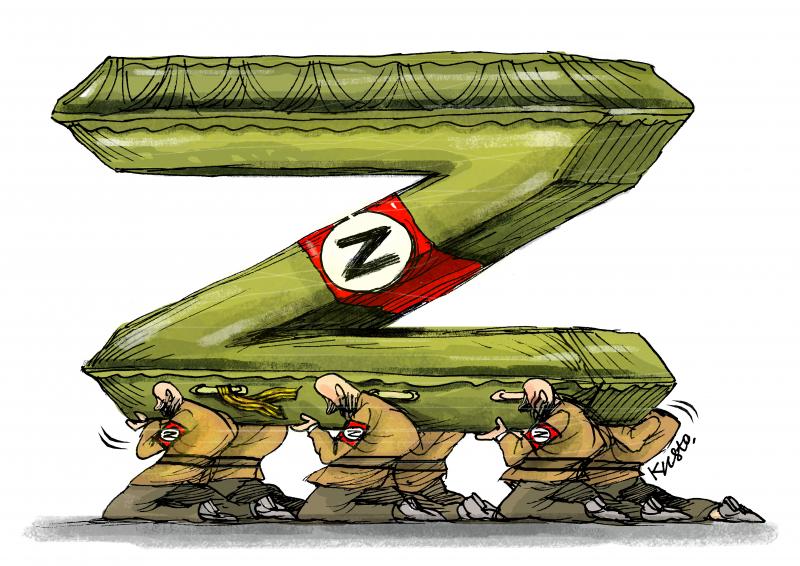As a rule, summers are extremely hot in Tbilisi, but for some reason all my major work has been done in summer and in Tbilisi at that. Now too, I’ve chosen a cafe with an isolated garden away from traffic noise and with few customers in the mornings. In the sweltering afternoon, mums with their kids like to relax in the shade, enjoying the coolness the garden offers. That’s exactly what happened yesterday – a young fair-haired woman walked in with her two children of about 10 and 12.
She was wearing expensive clothes and though I’m rather ignorant of fashion, it’s hard not to guess how much one has paid when the brand name is written in huge letters across the T-shirt. She ordered ice-cream for her children and ice coffee for herself, and then asked the waitress for the Wi-Fi password. That brought an end to my peaceful day spent in my favourite cafe.
In her Georgian-accented English, the waitress calmly told her it was StandwithUkraine. In a second the respectable-looking mum turned into a mythical monster: she shouted and yelled and swore in Russian which, unfortunately, I know quite well. Apparently, because she didn’t know Russian, the waitress failed to understand what the problem was, what the woman was saying or what made her scream so furiously. The woman worked herself into a hysterical state, shouting that everyone understood her perfectly well but refused to speak in Russian to her because they were Russophobes.
After raging for ten minutes, the flow of choicest swearing words subsided, and she left dragging her children along, still muttering profanities as she walked along the street. The kids’ strawberry and chocolate ice-cream and her ice coffee were left untouched on the table. But very soon three of four flies gauged themselves on the treat.
That’s how Georgia lives while the bloody war rages in Ukraine. At a glance, the country called Sunny Georgia in Soviet times hasn’t changed much, at least the Russians arriving today stubbornly demand the country to be the same solnechnaya Gruzia where they expect to be welcomed with smiles and faulty Russian with a funny accent.
A Russian province
According to the figures issued by the Georgian Ministry of Internal Affairs, 93,865 citizens of Russia arrived in Georgia in March and April. The number is twice the entire population of my native town of Poti, at the Black Sea coast. No further figures have been made public since then, but it’s enough to walk the streets of Georgian cities to feel one is in one of Russian provinces.
One only hears Russian in the central parts of the capital. In the beginning, in February and March, the Russians were discreet, even attaching the Ukrainian flags to their bags and clothes so as to demonstrate their allegiance, but that might have been done for their own safety. Today, more often than not, they express their discontent more brazenly if reminded of Ukraine – the country no sane and decent person can forget under the circumstances.
How has Georgia been affected by the Ukrainian war? The influence is huge and complex, impossible to describe within the confines of a short article, especially given that I’m neither a politician nor an economist but just an ordinary writer. But still: First and foremost, the invasion of Ukraine by Russia has brought back the memories of the 2008 war between Georgia and Russia. However insensitive or even brutal it might sound, the blood spilt by my 19-year old cousin who died in that war doesn’t allow me to use a more politically correct term for the tragic event than “war”.
Indeed, the August 2008 war has been revived in the collective memory of my citizens following the ruthless invasion of Ukraine. It has surfaced a still-recent trauma that cannot be hidden or eradicated even if that seems to be one of the main strategies of our government.
My opinion might sound naive, but when one lives in one’s own country without any desire to move elsewhere, like myself, when one loves his or her homeland, every step taken in the wrong direction leaves a deep scar and causes unbearable pain. This can explain my somewhat affected tone, stemming from the sense of utter helplessness when all you can do is join occasional protest rallies in the capital, when your shattered nervous system has to witness that those with the responsibility to act – namely the Georgian government – are not doing anything.
Shameful government
The same happened this time too. Thousands of us took to the streets while the Georgian authorities, whose formal or informal leaders have direct, criminal business interests in Russia, did nothing apart from making embarrassingly careful declarations. At times they even actually discarded caution, forcing us to publicly and very loudly apologise to the Ukrainian people for having such a shameful government. But does it serve as a consolation to those who hear air sirens several times a day, not knowing if they’d reach the safety of their bunkers on time?
Obviously, when the democratic institutions are subdued, when the government doesn’t reflect the general will of its society, social networks take on the role of informing the public. That’s particularly true for Georgia, where heated arguments and verbal battles rage across the social networks. But still, it’s all an expression of complete powerlessness on the part of the citizens, or at least some of them, a demonstration of despair after they realise they can do nothing to bring about the change. That’s when they exercise the right which isn’t denied to them yet – freedom of speech. But as an old proverb has it: the dog barks, but the caravan goes on.
Returning to the bare facts: the Russians arrived in Georgia en masse, and although they initially presented themselves as political refugees of Vladimir Putin’s regime, today it’s obvious that there are very few genuine refugees among them. The majority are fleeing the discomfort brought about by the European and US sanctions. And why not? Since the times of the Russian Empire, haven’t Russians always seen Georgia as an exotic, sunny country with marvellous landscapes and somewhat untamed people - the country they never considered worthy of independence? For them it was a small colony where they had brought civilisation, saving it from other threats at the end of the 18th century. So, it’s no surprise that today there are Russians – fed by the stereotypes about the Georgians from Pushkin, Lermontov and other writers – who yell at young Georgians for not speaking Russian, and call them Russophobes.
It would be wrong to see my example as an exaggeration. In today’s Georgia it’s quite common for the Russians who ‘escaped Putin’s regime’ to buy property, register businesses and, more importantly, to unashamedly demand not to be reminded of the events unfolding in Ukraine. They seem to be neither aware of them nor particularly worried about the ongoing war.
Now I’d like to step back in time, to much earlier than the start of the war. Whenever I talked to my European colleagues, especially from Germany and France, about the Georgian-Russian relationship, I always felt their sceptical attitude. I caught their doubtful gaze thrown at me, as if to hint I was suffering from Russophobia, gripped by paranoia, while the things I described weren’t that bad in reality. I’m fully aware that it’s next to impossible to explain the complexity of those relations to a person unfamiliar with the context.
A couple of conversations aren’t enough to convince someone that Georgia was a colony of the Russian Empire after 1801 – colony being precisely the correct term. How can you describe a century-long struggle to preserve your own language, one that not only isn’t related to either Russian or other Slavonic languages, but doesn’t even belong to the Indo-European group? Surely the world has heard the Russian claim that Ukrainian isn’t an independent language, that it’s a Russian dialect. As a perfect speaker of the Russian language I can firmly state that Ukrainian is a language in its own right, different from Russian, the language that the Empire has been unsuccessfully fighting for so long. The truth, my dear readers, is that the Ukrainian language has survived.
My country faces a critical choice. Either the acting government gives up their Russian ties and interests, their openly pro-Russian rhetoric, or we will remain where we have been for over two hundred years – in the cloaca of the Great Russian Empire
When Russia invaded Ukraine in February, many hitherto sceptical Europeans began to see the truth. They admitted that Russia poses a genuine threat to the world, and that I’m not suffering from Russophobia. It’s tragic that it required a humanitarian catastrophe on such a scale to convince them, that such a staggering number of victims was needed to make them see the truth. I took a short break in writing and scrolled the social networks.
The Georgian news agencies were posting the pictures of the funeral of 4-year old Liza killed during Vinnytsia shelling. The unrelenting war is going on, with no visible end, and if we have learnt a bitter lesson, if we have become brave to face the truth at such an inhuman cost, it’s our duty to remember it well, not to lapse into our comfort zones.
But the reality is that the informational policy has changed in Europe and in Georgia as well: events in Ukraine no longer hold the leading position, or rather are less emphasised compared to the first months of the invasion.
Georgia is moving into decisive times. To obtain candidate status for European Union membership, the country has to meet a wide variety of requirements and demands. My country faces a critical choice. Either the acting government gives up their Russian ties and interests, their openly pro-Russian rhetoric, and takes adequate action in the right direction, or we will remain where we have been for over two hundred years – in the cloaca of the Great Russian Empire. I take full responsibility for choosing such a vulgar word. In fact, I have tried to curb my indignation, fury and outrage, to keep my emotions from pouring onto paper, to ensure the article is as mild as possible. Otherwise, it would have been an unbroken wail of hopelessness and misery without any meaningful content.
I am writing this in July 2022. Once again, Georgia is suffering from Russia as if from a chronic viral disease that cannot be fully cured. However, it’s possible to control the malady through correct treatment. And all the while, people are dying in Ukraine while I’m writing that the wi-fi password is StandwithUkraine in a Tbilisi cafe. That’s all I can do. Sorry, Ukraine.

In association with S. Fischer Stiftung
Was this article useful? If so we are delighted!
It is freely available because we believe that the right to free and independent information is essential for democracy. But this right is not guaranteed forever, and independence comes at a cost. We need your support in order to continue publishing independent, multilingual news for all Europeans.
Discover our subscription offers and their exclusive benefits and become a member of our community now!












